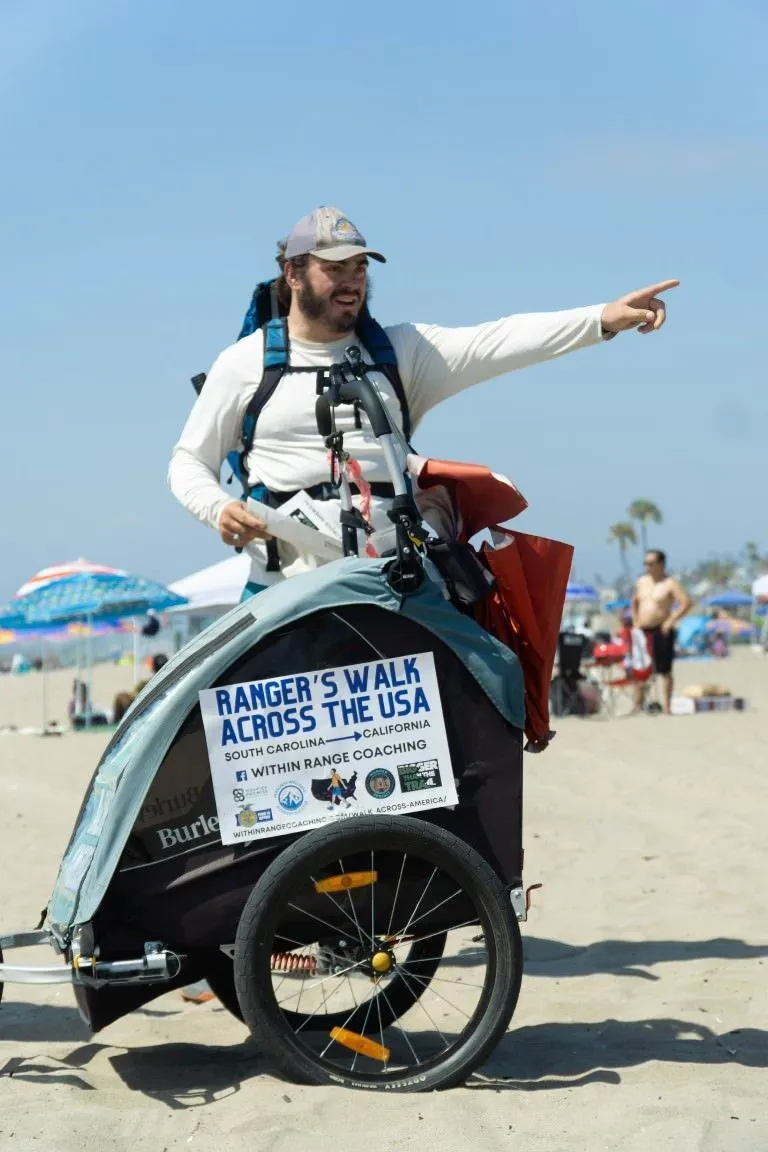For a self-proclaimed "normal dude," Ranger Kielak finished off an abnormal feat on the Westside this past weekend.
On August 31, Kielak ended a 3,000-mile trek across America, walking down the Westside beaches to his Dockweiler Beach finish line and completing a "bucket list item" that the life coach and former county agricultural inspector said was an "eye-opening" experience.
Inspired by singer Mike Posner’s cross-country walk in 2018, as well as other social media users who took on the task, Kielak began planning the trip in July 2022. Not only did he take up running in the form of half-marathons, but he hired a personal trainer in order to be "muscularly sound" for the trip ahead.
Beginning in Myrtle Beach, South Carolina, the grueling 3,000 miles required both his newfound cardio and gained strength, as he pushed a cart of food and supplies along his journey. Averaging about a marathon’s worth of walking per day, 26 miles, the trek took Kielak through South Carolina, Georgia, Alabama, Mississippi, Arkansas, Oklahoma, Texas, New Mexico and Arizona before his California finish line.
Kielak said that others had told him he might have a "harder time" once he reached Los Angeles, adding that he should avoid certain areas, but his walk through the city made him "rethink" his biases. The LA area was extremely kind to him, he stated, including unhoused individuals offering to refill his supply cart.
"When I got there, I had so many people stop to talk to me, to give me money, to give me food or offer me a meal … (I walked) through LA four to five days, and each day I had anywhere from two to seven, eight people stop and talk to me," Kielak said. "It was just very surprising, really broke (a) lot of stereotypes I think I had going into it."
As wild of an idea it is to cross the nation, the path he took showed even more guts, with Kielak saying he walked the majority of the route on highways because it was the "most direct route" and due to his cart sticking him away from hiking trails.
"I don’t think the cart would have survived getting pushed up and down and all around rocky terrain," Kielak said.
Though both him and his cart survived, it wasn’t without a few scares from the motorized population.
"(In) New Mexico, I remember there was one day I had three to four close calls in one day," he added. "They would either not get over at all (or) wouldn’t get over enough for me to feel seen … there’s a couple of times (cars) kind of swerved when they were close to me … I never felt like they were within inches, but pretty close."
Aside from his allies in LA, Kielak had supporters nationwide, as host families took him in during his journey. When a family couldn’t host him in an area, or he found himself in a bigger city, he would either camp out or find a hotel.
"I had a ton of people on social media, they would see my route … friends would connect it with someone or (a) past host knew someone in the future area, and people just let me stay in extra bedrooms," he said. "There was one (man) in Alabama that had a shed on the side of his house that he let me camp in before he put all his tools in there … I had the host families pretty consistently."
Others were gracious with their time because of Kielak’s mission to raise $100,000 in funds for three worthy causes. His time as an agricultural inspector in Modesto, as well as his high school years in Future Farmers of America (FFA) led him to support the National FFA Organization. Another cause was The Hospice Promise Foundation, supporting non-medical hospice-related expense relief for Grace Hospice in Tulsa, Oklahoma where his grandpa stayed in his final days fighting Alzheimer’s.
Finally, Kielak’s walk raised money for Bigger than the Trail, which provides free therapy and mental health services that jibe with his values of physical and mental well-being. Having a rough time in college with his weight, Kielak credited exercise to help on both of those fronts.
"I started running for my own mental health to lose weight, gain confidence, and it helped me a ton, just kind of be able to pull myself out of that pit that I (fell) into … I just really like (Bigger than the Trail’s) mission of shining light on mental health, they’re one of the organizations that really brings it to the forefront, and combining physical and mental health just really aligns with what’s worked for me in the past. So hopefully, that also works for others."


